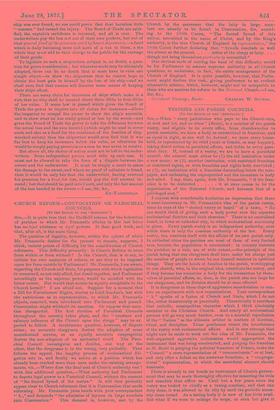CHURCH REFORM—CONVOCATION OR PAROCHIAL
COUNCILS.
[To THE EDITOR OF THE "SPECTAT011.1
is quite true that the Sheffield scheme for the federation -of parishes to which Mr. Fremantle alludes in this last letter has no legal existence or legal powers. It does good work, and that, after all, is the main thing.
The question of legality, however, within the sphere of which Mr. Fremantle desires for the present to remain, suggests, I think, various points of difficulty for the consideration of Church -reformers. This difficulty primarily : Is Church Reform to come 'from within or from without? Is the Church, that is to say, to initiate her own measures of reform, or are they to be imposed 'upon her from outside by Parliament? Mr. Fremantle, I am aware, regarding the Church and State, for purposes with which legislation is concerned, as not only allied, but fused together, and Parliament accordingly as the supreme power, would be satisfied with the latter course. But would that course be equally acceptable to the Church herself ? I am afraid not. Suppose for a moment that a Bill for Parishioners' Rights, similar to Lord Sandon's, but with the restrictions as to representation, to which Mr. Fremantle .objects, removed, were introduced into Parliament and passed. Convocation might withhold its sanction. Or suppose that sanc- tion disregarded. The first election of Parochial Councils throughout the country takes place, and the "constant and salutary influence of the Church upon the clergy" may be ex- pected to follow. A troublesome question, however, of dispute arises ; an eccentric clergyman desires the adoption of some unauthorised service, or an equally eccentric congregation desires the non-adoption of an authorised creed. The Paro- chial Council investigates and decides, one way or the other, that the clergyman is in the wrong, very probably. Then follows the appeal, the lengthy process of ecclesiastical liti- gation sets in, and finally we arrive at a position which has already been reached more than once under the existing arrange- ments, viz.,—Where does the final seat of Church authority rest ? with this additional question,—What authority had Parliament to depute legal power to a Parochial Council, without the consent -of "the Sacred Synod of the nation." It will then probably appear clear to Church reformers that it is Convocation that needs reforming. Mr. Fremantle joins hands with your correspondent "A.," and demands "the admission of laymen in large numbers into Convocation." This demand is, however, met by the Church by the assurance that the laity in large num- bers are already to be found in Convocation, for, accord- ing to the 139th Canon, "The Sacred Synod of this nation, assembled in the name of Christ, and by the King's authority, is the true Church of England by representation," the 140th Canon further declaring that "Synods conclude as well
the absent as the present either of the clergy or laity. . . . though not being themselves particularly assembled."
One obvious mode of cutting the knot of this difficulty would be for Parliament to assume supreme authority in all Church questions, to undertake, in fact, the entire management of the Church of England. It is quite possible, however, that Parlia- ment might decline this task, giving preference to an evident alternative scheme, which, however, might not be acceptable to those who are anxious for reform in the National Church.—I am, Sir, &c.,


































 Previous page
Previous page